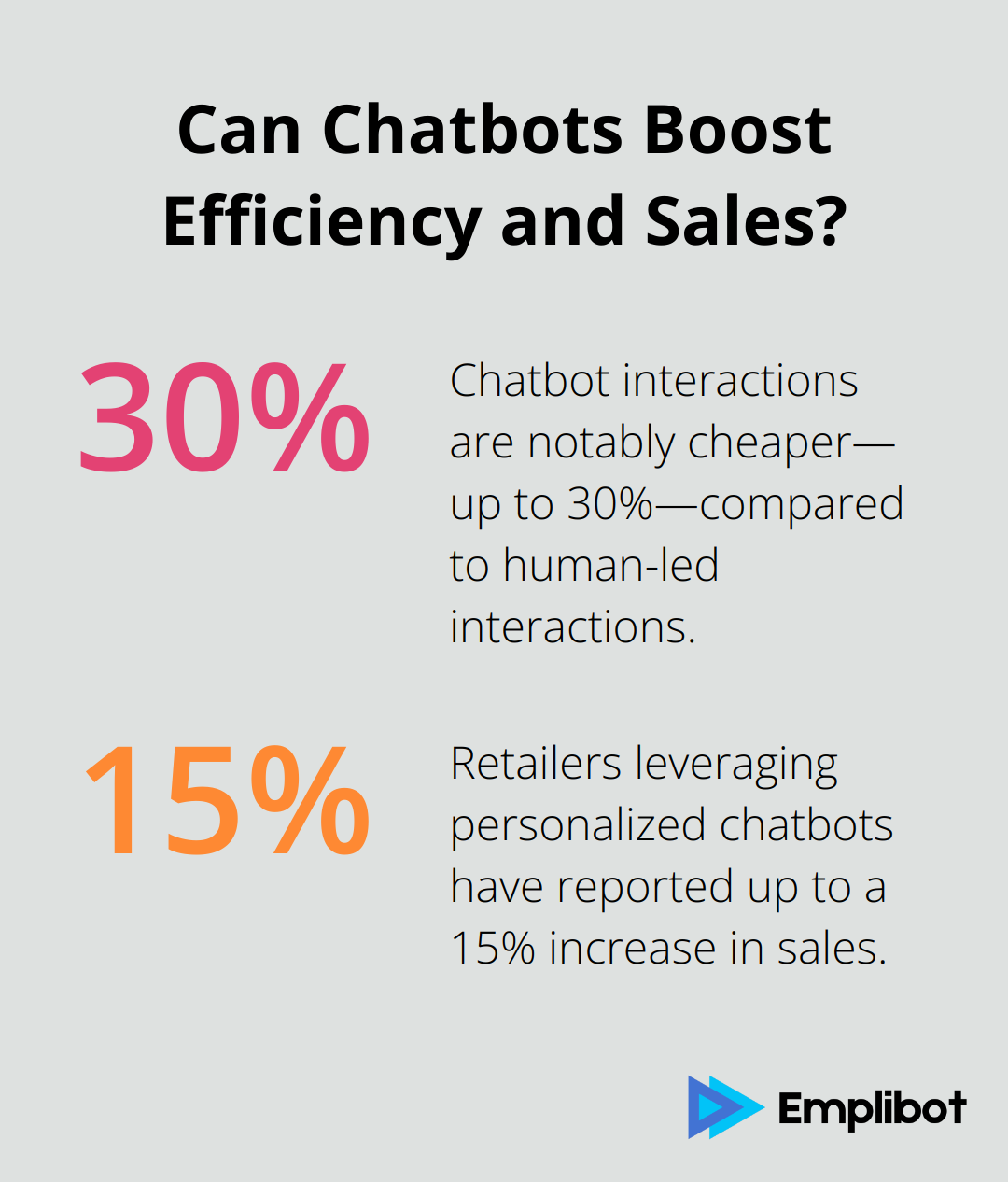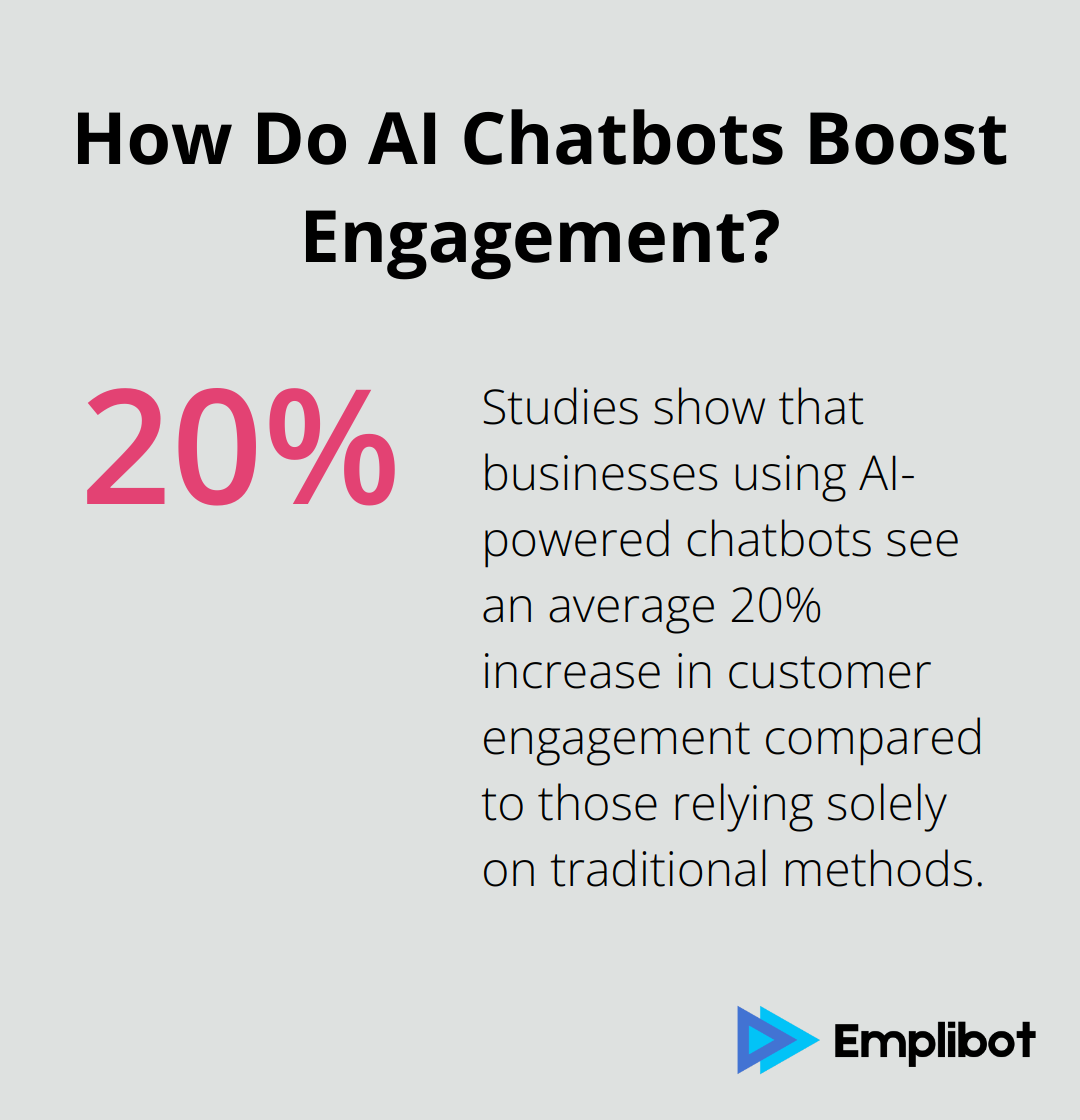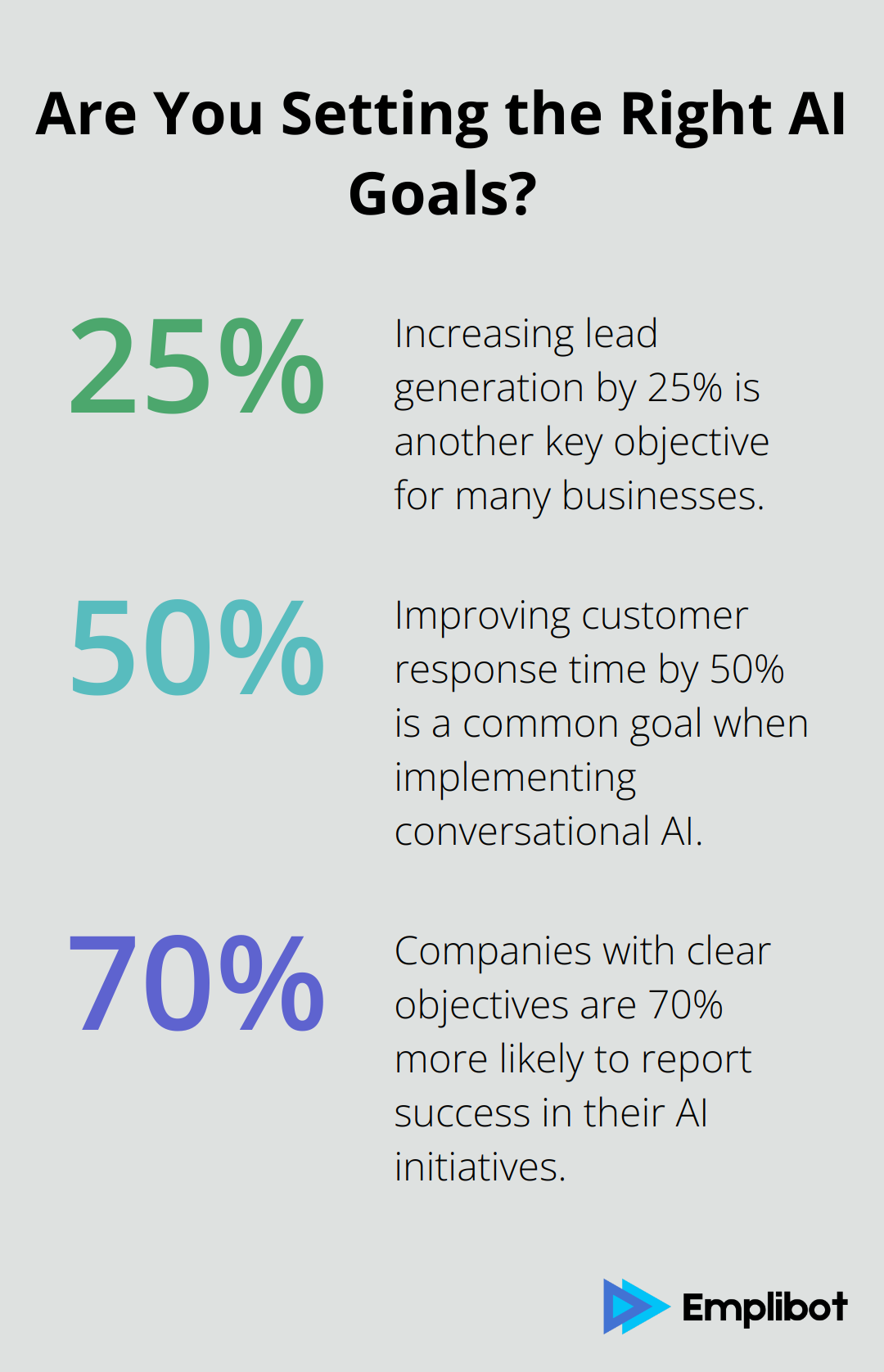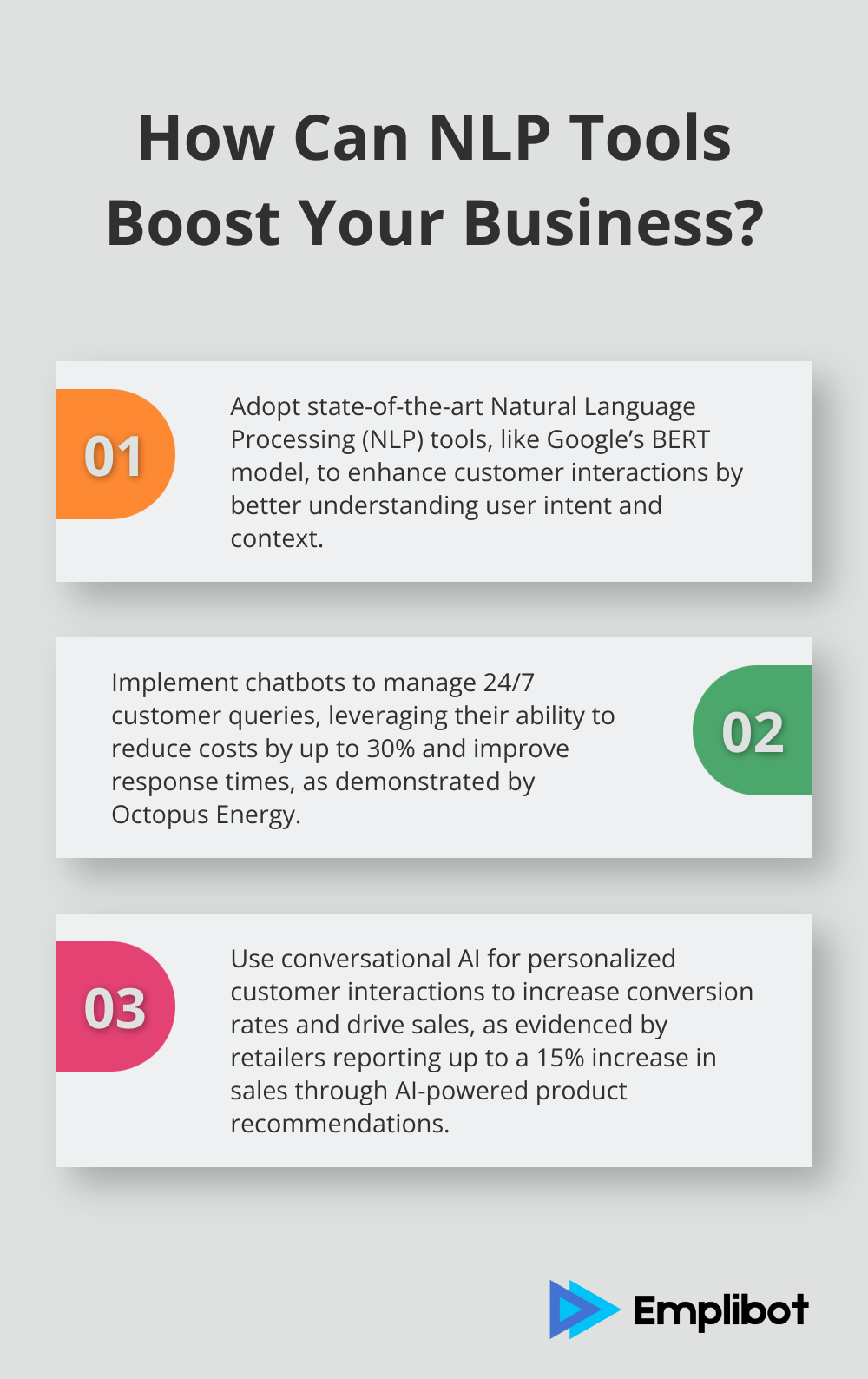Conversational AI is transforming how businesses connect with their customers. With advancements in technology, marketing strategies are evolving rapidly.
We at Emplibot are seeing firsthand the impact these tools have on customer engagement.
In this blog post, we’ll explore the key components, advantages, and practical steps to implement conversational AI in your marketing strategy.
Contents
ToggleWhat Are the Key Components?
The foundation of conversational AI marketing can be attributed to three pivotal elements: Natural Language Processing (NLP), chatbots and virtual assistants, and the ability to deliver personalized customer interactions. Understanding each of these components is essential for leveraging conversational AI effectively.
Natural Language Processing (NLP)
Natural Language Processing is the backbone of conversational AI. By enabling machines to understand and respond to human language, NLP enhances the user’s experience significantly. The power of NLP lies in its ability to interpret context, sentiment, and language nuances, delivering more accurate responses.

A prime example is Google’s BERT model, which significantly improved search result accuracy by better understanding user intent. Utilizing advanced NLP tools like this helps marketers create more relatable and efficient customer interactions. More businesses should adopt state-of-the-art NLP solutions to stay competitive in 2024.
Chatbots and Virtual Assistants
Chatbots and virtual assistants are front-runners in the implementation of conversational AI. These tools are not just about automation; they are revolutionizing customer service, lead generation, and even sales processes. The capability of chatbots to handle 24/7 customer queries without fatigue means substantial cost savings and enhanced customer satisfaction.
Chatbot interactions are notably cheaper—up to 30%—compared to human-led interactions, and they can handle simple to complex queries efficiently. For instance, Octopus Energy’s use of chatbots has significantly reduced query-resolution times, resulting in a more seamless user experience.
Personalized Customer Interactions
Personalization, driven by conversational AI, has shown extraordinary promise in marketing. By harnessing data from previous interactions, AI can tailor responses and product recommendations to individual preferences. This level of personalization has been shown to increase conversion rates, drive customer loyalty, and ultimately boost revenue.
For example, AI-powered personalized product suggestions can enhance customer lifetime value. Retailers leveraging personalized chatbots have reported up to a 15% increase in sales. In the competitive landscape, businesses need to embrace these capabilities to meet rising consumer expectations.
For further insights into how conversational AI can revolutionize your customer interactions, check out our guide on conversational marketing AI uses for beginners.
Why Use Conversational AI in Marketing
Adopting conversational AI in marketing is not just a trend. It’s a transformation that directly impacts key business metrics by improving engagement, enhancing scalability, and driving data insights.
Improved Customer Engagement
Conversational AI is driving customer engagement to new heights. The ability to provide real-time, contextually relevant information significantly reduces response times, fostering a more interactive and satisfying customer experience. Studies show that businesses using AI-powered chatbots see an average 20% increase in customer engagement compared to those relying solely on traditional methods.

For instance, Sephora’s AI chatbot has revolutionized online retail by offering personalized beauty advice, leading to higher engagement and increased conversion rates. AI creates a more interactive environment that keeps customers coming back.
Scalability of Support and Service
One of the greatest benefits of conversational AI is its scalability. AI chatbots can handle thousands of interactions simultaneously, without compromising on the quality of service. This 24/7 availability ensures that customers always have access to support, irrespective of time zones or peak hours. Businesses save approximately 30% on customer service costs by employing chatbots.
Take the example of UK-based company Octopus Energy, which uses chatbots to manage customer inquiries efficiently. This approach has led to quicker resolution times and higher customer satisfaction rates. Scalable support means meeting customer needs more promptly and efficiently, contributing to overall positive sentiment toward the brand.
Enhanced Data Collection and Insights
Conversational AI tools gather vast amounts of data from every customer interaction. This data is invaluable for understanding customer preferences and behaviors. Through AI, businesses can analyze trends and sentiments, which can inform future marketing strategies.
Data from AI interactions can reveal key insights that lead to more targeted marketing campaigns. For instance, sentiment analysis helps in determining customer satisfaction levels, allowing businesses to tweak their strategies in real-time. Companies leveraging AI have seen an uptick of up to 15% in sales conversions more effective content distribution.
For practical steps to implement these insights in your strategy, explore how you can use AI for customer engagement.
By integrating conversational AI into marketing, businesses are not only enhancing customer service but also driving key business outcomes, from increased engagement to improved operational efficiency.
How to Implement Conversational AI in Your Marketing Strategy
Implementing conversational AI begins with defining clear objectives and use cases. Know what you want to achieve and how conversational AI fits into your broader marketing strategy. Be specific. Are you aiming to improve customer support, enhance lead generation, or boost sales? Defined goals will guide the deployment of your solution.
Set Clear Objectives
Too often, businesses adopt new technologies without a clear purpose, leading to subpar results. Define goals such as improving customer response time by 50%, increasing lead generation by 25%, or boosting online sales by 15%. Case studies show that companies with clear objectives are 70% more likely to report success in their AI initiatives.

Align these objectives with your overall business goals. If your primary aim is customer retention, your conversational AI should focus on personalized interactions and prompt issue resolution.
Choose the Right Tools
Selecting the right tools and platforms is a critical step. There are numerous conversational AI platforms available, such as Dialogflow, IBM Watson, or Microsoft’s Bot Framework. Choose a tool that integrates seamlessly with your existing CRM and marketing automation systems.
For instance, combining AI chatbots with your CRM can automate customer data entry, saving valuable time. About 60% of businesses that use integrated AI tools report enhanced operational efficiency. Evaluate features like multi-language support, scalability, and ease of use. Opt for platforms that offer robust analytics to track performance and user interaction metrics.
Monitor and Optimize
Once implemented, continuous monitoring and optimization are non-negotiable. Use KPIs such as response time, customer satisfaction scores, and conversion rates to measure success. Chatbots with sentiment analysis capabilities can provide insights into customer emotions and reception.
Iterative improvements based on feedback and performance data are essential. Sephora, for example, continually optimizes its chatbot interactions by analyzing customer feedback, leading to an increase in engagement and a reduction in query resolution time by 30%.
Utilize A/B testing to determine which scripts and interactions yield the best results. Tools that offer real-time analytics will help in refining strategies quickly. For more practical tips on monitoring and optimizing performance, read about real-time analytics.
By starting with well-defined objectives, selecting the right tools, and focusing on continuous improvement, businesses can harness the full potential of conversational AI in their marketing strategies.
Conclusion
Conversational AI is clearly redefining marketing strategies with its ability to enhance customer engagement, scalability, and data insights. Natural Language Processing, chatbots, and personalized interactions form the core elements that empower businesses to connect with their audience more effectively.

By leveraging tools like AI-powered chatbots, companies are saving up to 30% in customer service costs while maintaining high levels of satisfaction. Real-world examples, such as Octopus Energy and Sephora, demonstrate the transformative impact of integrating conversational AI, leading to quicker query resolutions and improved customer experiences.
The future of marketing lies in harnessing AI to provide real-time, personalized engagements at scale. Businesses that prioritize AI integration in their strategies are more likely to see improved operational efficiency and increased sales conversions.
For those looking to enhance their marketing efforts with conversational AI, now is an opportune time to explore these innovations. For seamless and automatic SEO content creation and more, visit emplibot and see how we can help you build your blog effortlessly. Dive into the future of marketing and stay ahead with conversational AI.










 Rated Excellent 4.5
Rated Excellent 4.5